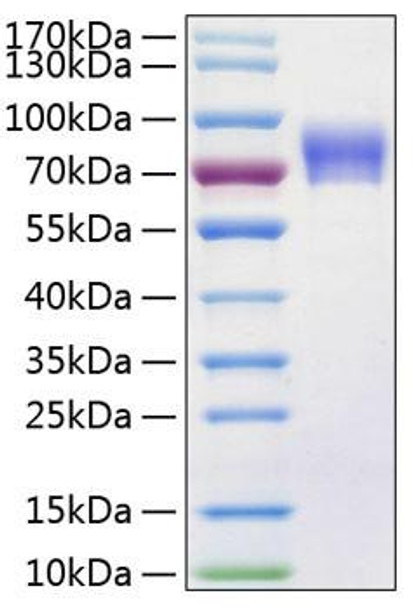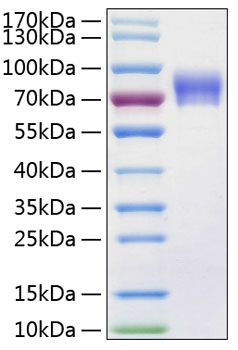Description
Recombinant Human Vanin-1/VNN1 Protein
The Recombinant Human Vanin-1/VNN1 Protein is a biologically active recombinant protein that plays a significant role in various cellular processes and signaling pathways in human biology. This protein is widely employed in immunological research, cell biology studies, protein-protein interaction analyses, and therapeutic development, providing researchers with a reliable tool for investigating Vanin-1/VNN1 function and its implications in health and disease.
This product (SKU: RPCB0228) is produced using HEK293 cells and features a C-His tag for convenient detection and purification. The protein exhibits a calculated molecular weight of 53.07 kDa with an observed molecular weight of 70-90 kDa under denaturing conditions, achieving ≥ 95 % as determined by SDS-PAGE.. Functional bioactivity has been validated through rigorous quality control assays, confirming its suitability for demanding research applications.
Key Features
| High Purity by Affinity Chromatography | |
| Mammalian & Bacterial Expression Systems | |
| High lot-to-lot consistency via strict QC |
| Product Name: | Recombinant Human Vanin-1/VNN1 Protein |
| SKU: | RPCB0228 |
| Size: | 10 μg , 20 μg , 50 μg , 100 μg |
| Reactivity: | Human |
| Synonyms: | VNN1, HDLCQ8, Tiff66, vanin 1 |
| Tag: | C-His |
| Expression Host: | HEK293 cells |
| Calculated MW: | 53.07 kDa |
| Observed MW: | 70-90 kDa |
| Gene ID: | 8876 |
| Protein Description: | High quality, high purity and low endotoxin recombinant Recombinant Human Vanin-1/VNN1 Protein (RPCB0228), tested reactivity in HEK293 cells and has been validated in SDS-PAGE.100% guaranteed. |
| Endotoxin: | < 0.1 EU/μg of the protein by LAL method. |
| Purity: | ≥ 95 % as determined by SDS-PAGE. |
| Formulation: | Lyophilized from a 0.22 μm filtered solution of PBS, pH 7.4.Contact us for customized product form or formulation. |
| Bio-Activity: | Measured by its ability to hydrolyze pantetheine to pantothenate and cysteamine. The specific activity is >3000 pmol/min/μg. |
| Reconstitution: | Centrifuge the vial before opening. Reconstitute to a concentration of 0.1-0.5 mg/mL in sterile distilled water. Avoid vortex or vigorously pipetting the protein. For long term storage, it is recommended to add a carrier protein or stablizer (e.g. 0.1% BSA, 5% HSA, 10% FBS or 5% Trehalose), and aliquot the reconstituted protein solution to minimize free-thaw cycles. |
| Storage: | Store at -20℃.Store the lyophilized protein at -20℃ to -80 ℃ up to 1 year from the date of receipt. After reconstitution, the protein solution is stable at -20℃ for 3 months, at 2-8℃ for up to 1 week. |
Vanin-1 is a cell membrane protein which belongs to the CN hydrolase family and BTD/VNN subfamily. Vanin-1 contains one CN hydrolase domain. It is widely expressed with higher expression in spleen, kidney and blood. It is overexpressed in lesional psoriatic skin. Vanin-1 is also a member of the Vanin family of proteins which share extensive sequence similarity with each other, and also with biotinidase. The family includes secreted and membrane-associated proteins, a few of which have been reported to participate in hematopoietic cell trafficking. No biotinidase activity has been demonstrated for any of the vanin proteins, however, they possess pantetheinase activity, which may play a role in oxidative-stress response. Vanin-1 is an epithelial pantetheinase that provides cysteamine to tissue and regulates response to stress. Vanin-1 is expressed by enterocytes, and its absence limits intestinal epithelial cell production of proinflammatory signals. Vanin-1 regulates late adhesion steps of thymus homing under physiological, noninflammatory conditions. The early impact of vanin-1 deficiency on tumor induction was directly correlated to the amount of inflammation and subsequent epithelial proliferation rather than cell death rate. Vanin-1 molecule was shown to be involved in the control of thymus reconstitution following sublethal irradiation.







